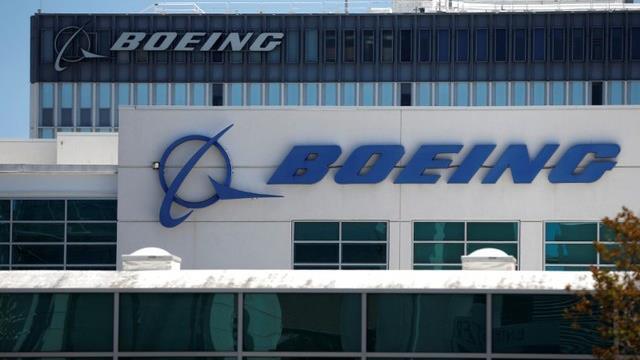Boeing stock soars on earnings, lifting Dow
Shares of U.S. aerospace giant Boeing soared more than 4% on Wednesday following strong first-quarter results that crushed analysts’ expectations and helped lift the Dow Jones Industrial Average higher after stocks tumbled in the previous trading session.
The Chicago-based company reported earnings per share of $3.64, compared with the $2.58 per share that analysts surveyed by Thomson Reuters had expected. Boeing reported revenue of $23.38 billion versus the forecast $22.35 billion.
As a result of the positive first-quarter numbers, the company raised its full-year earnings forecast by 50 cents to $16.40 to $16.60. Boeing kept its revenue outlook at the same range of $96 billion to $98 billion.
The world’s largest airplane maker delivered 184 commercial aircraft in the first quarter of the year, and the commercial division as a whole saw revenue increase to $13.7 billion, up 5% from the same period in the prior year. A standout is its new 737 MAX family of single-isle, twin-jet aircraft. Because of the strength of the cargo market, Boeing said it will also increase the production rate of its 767 program from 2.5 to 3 per month beginning in 2020.
“Order growth was good; it just seemed like a quarter on which they hit on all cylinders,” CFRA analyst Jim Corridore told FOX Business. “The operating margin on the commercial side was much better than expected as well. Everything seemed to move in the right direction.”
Boeing’s defense, space and security division also performed well, with first-quarter revenue growing to $5.8 billion – 13% from a year ago – boosted by the C-17 transport jet, international fighters and weapons volume. While Boeing picked up a new contract for 28 F/A-18 fighter jets from Kuwait, the order backlog in the division decreased to $50 billion from $63 billion in the same period in 2017.
“In terms of the backlog on the defense side, that side’s a lot choppier than the commercial side, which is generally pretty smooth … defense orders come in a very irregular fashion,” Corridore said. “To see a little bit of a dip in the defense side is not really a problem.”
Boeing did have problems with its KC-46 aerial refueling aircraft, leading to cost overruns and delivery delays with the U.S. Air Force. The company signed the deal in 2011 to build 179 aircraft for $35 billion. Boeing believes it can deliver 18 tankers by the end of 2018, according to Defense News, though the military branch doesn’t see eye-to-eye with the target date.
“The KC-46 program has been a troubled program for this company for a couple of years,” Corridore said. “But it’s getting better. And certainly there’s going to be continued costs for that program, but the execution has been improved and the cost in comparison to the prior first quarter last year is much better.”
Despite being the top performing stock on the Dow Jones Industrial Average in 2017, climbing 88% over the past 12 months, Boeing shares have been volatile so far this year because of threats of a trade war with China. In response to President Donald Trump’s proposed tariffs on 1,300 Chinese goods – including aircraft parts – China, the world’s largest aerospace market, proposed its own duties targeting Boeing’s 737, but not its heavier long-haul jets.
Still, Corridore doesn’t see the tariff issue as a major concern and thinks there is plenty of demand to support Boeing and its rival Airbus. “Even if every airline in China said we’re only going to buy Airbus aircraft, they can’t possibly do that,” he said. “So there’s plenty of demand to go around. China is the fastest-growing aerospace in the world, and it’s going to continue to do so, and Boeing’s going to have a place there.”
Meanwhile, Boeing remains interested in a partnership with Brazilian plane maker Embraer. According to a Brazilian newspaper citing anonymous sources familiar with the negotiations, the two companies are in “very advanced” stages of talks. Boeing Chairman and CEO Dennis Muilenberg told Reuters last month the company was “making progress” in talks with Embraer. Boeing, however, had no further comment regarding the matter on Wednesday.




















